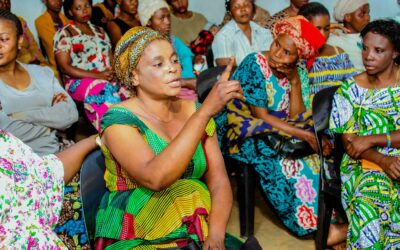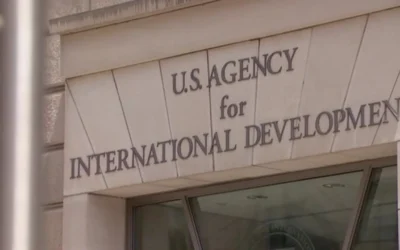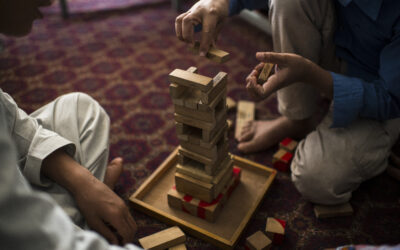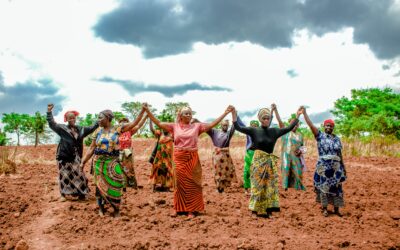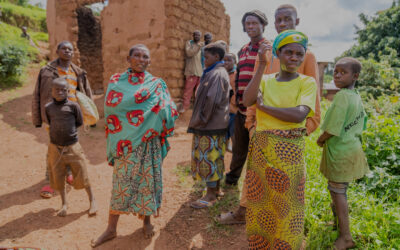It’s Time We Rethink Orphan Care
Orphanages are often serving as a stopgap for families who are struggling in poverty.
In Uganda, Harriet lives with her two daughters but struggles to provide for them. With no choice but to leave her abusive husband, Harriet did not have the means to provide food, shelter, and stability for her girls by herself. In desperation, she decided to place her children in an orphanage where she hoped they would at least be fed and cared for.
Millions of families living in poverty face this desperate decision. 80% of children living in orphanages and children’s homes have a living parent and nearly all have extended family. It begs the question, if they aren’t orphans, then why are they living in orphanages? For so many like Harriet, the answer is poverty. Parents who are already struggling to meet the most basic needs of their family may experience a crisis in the form of illness, disability, divorce, job loss, natural disaster, or conflict that leads to their children being placed in an orphanage. These parents turn to orphanages out of desperation and with the hope that their children will be better cared for.
The truth is, no matter how well-resourced the orphanage is, it can’t take the place of a family. Families provide the love, belonging, and identity that children need to thrive.
Research over the last several decades has recognized that orphanages and children’s homes have negative impacts on children’s physical, emotional and social development. They separate children from their family and community, which are essential in developing health relationships and outcomes into adulthood. Adults who grew up in orphanages have increased rates of unemployment, homelessness, sexual exploitation, and unhealthy relationships. There is a better way. We can invest in strengthening vulnerable families to keep children in families and alleviate the poverty that separates them.
Incredibly, when Harriet went to drop off her daughters at the police station so they could place them in a local orphanage, they told her there was another option. She learned about Abide Family Center, an organization that empowers families to stay together. Harriet and her daughters were given food, a safe place to stay, and they were shown love. Abide provided parenting classes, business training, and daycare so that Harriet could work at the business she started. Instead of placing her children in the orphanage, Harriet was able to be empowered to provide for them herself.
Around the world, strategies are working to keep children in families such as economic strengthening, parent support resources, enabling access to education, and supporting emotional needs. It’s time to redirect support from orphanages to family-strengthening efforts.
You become a part of the solution for vulnerable families when you come alongside One Day’s Wages partners, like Abide Family Center, who are alleviating hunger and other consequences of poverty around the world and strengthening families so they can care well for their children.
Our hope is that one day, Harriet and women just like her around the world would never have to make a decision between caring for their child or ensuring their child has food and shelter. That in a crisis these families would find support within their community. Every child deserves a safe and loving family.
—————-

Guest blogger Allison Coble is the Director of Programs for the Faith to Action Initiative, which seeks to educate and mobilize Americans towards best practices in global orphan care.
More stories of impact
Turning Challenges into Opportunities: Masoka’s Journey of Empowerment
Masoka’s hands are stained with the rich soil of the land she now calls home. A 37-year-old mother of four, she arrived at Dzaleka Refugee Camp in Malawi after fleeing the conflict in her home country, the Democratic Republic of the Congo. The future felt uncertain,...
What Was USAID, and What Now?
USAID has made news headlines constantly over the last few months. You may find yourself wondering: what is USAID, and is One Day’s Wages affected by its dismantling? As a global development organization, we at ODW care deeply about the people who depend on foreign...
Growing Love, One Drop at a Time: How One Woman Turned Her Birthday into a Gift of Clean Water
When Sara, a graphic designer and mother from Oregon, started thinking about how to celebrate her birthday, she decided to do something different—something meaningful. With a belief that “we are all connected… with the power to affect change by how we live our own...
Bridging the Gap: An Update on Our Response to the Funding Freeze
In Matoh, Cameroon, a mother prepares to give birth. Life in a conflict zone means getting to a safe facility with trained health workers is nearly impossible. Fortunately, a new mobile clinic begins offering prenatal care and transportation to a birthing clinic,...
Why We Invest in Women
There’s an old Ghanaian proverb: “If you educate a man, you educate an individual. But if you educate a woman, you educate a family.” On this International Women’s Day, we celebrate the power of women—how their resilience, leadership, and determination transform not...
The Case for Social Inclusion
Today is the World Day of Social Justice! Never heard of it? Never fear, we’re here to fill you in. In 2009, the United Nations General Assembly launched the World Day of Social Justice to recognize our on-going need for inclusive economic development and decent work...
LEARN
Leadership
Transparency
Read the Latest
Contact Us
COLLABORATE
Faith Groups
Schools
Businesses
Get Involved
One Day’s Wages exists to alleviate extreme poverty by investing in, amplifying, and coming alongside locally led organizations in underserved communities.
©2025 One Day's Wages is a registered 501(c)(3) organization | Tax ID #26-2566653 | Privacy policy | Terms of use
P.O. BOX 17575 Seattle, WA 98127 | Contact us

